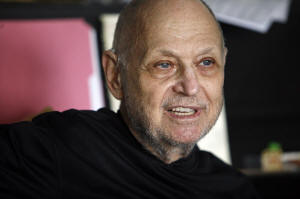Charles Strouse, Broadway composer of 'Annie' and 'Bye Bye Birdie,' dies
at 96
[May 16, 2025]
By MARK KENNEDY
NEW YORK (AP) — Three-time Tony Award-winner Charles Strouse, Broadway's
industrious, master melody-maker who composed the music for such classic
musical theater hits as "Annie," "Bye Bye Birdie" and "Applause," died
Thursday. He was 96.
Strouse died at his home in New York City, his family said through the
publicity agency The Press Room.
In a career that spanned more than 50 years, Strouse wrote more than a
dozen Broadway musicals, as well as film scores and "Those Were the
Days," the theme song for the sitcom "All in the Family."
Strouse turned out such popular — and catchy — show tunes as "Tomorrow,"
the optimistic anthem from "Annie," and the equally cheerful "Put on a
Happy Face" from "Bye Bye Birdie," his first Broadway success.
"I work every day. Activity — it's a life force," the New York-born
composer told The Associated Press during an interview on the eve of his
80th birthday in 2008. "When you enjoy doing what you're doing, which I
do very much, I have something to get up for."
Deep into his 90s, he visited tours of his shows and met casts. Jenn
Thompson, who appeared in the first “Annie” as Pepper and directed a
touring version in 2024, recalls Strouse coming to auditions and
shedding a tear when a young girl sang “Tomorrow.”
“He was tearing up and he put his hand on mine,” she recalled. “And he
leaned in to me and very quietly said, ‘That was you. That used to be
you.’ And I thought I would die. I thought my heart would drop out of my
shoes.”
She added: “He’s so gorgeously generous and kind. He has always been
that way.”

‘Bye Bye Birdie’ lifts him up
His Broadway career began in 1960 with “Bye Bye Birdie,” which Strouse
wrote with lyricist Lee Adams and librettist Michael Stewart. “Birdie,”
which starred Dick Van Dyke and Chita Rivera, told the tale of an Elvis
Presley-like crooner named Conrad Birdie being drafted into the Army and
its effect on one small Ohio town.
Strouse not only wrote the music, but he played piano at auditions while
Edward Padula, the show’s neophyte producer, tried to attract financial
backers for a production that would cost $185,000.
“We never stopped giving auditions — and people never gave money at all.
The idea of using rock ‘n’ roll — everybody was so turned off,” Strouse
said.
Finally, Padula found Texas oilman L. Slade Brown. When he heard the
score, he said, in a Texas twang, “I like those songs,” pushed Strouse
aside and picked out the tune of “Put on a Happy Face” on the piano.
Brown then said, “How much do you fellas need?” and wrote out a check
for $75,000 to cover the start of rehearsals. “Suddenly, the world
turned Technicolor,” Strouse remembered.
The popularity of “Birdie” spawned a film (with Van Dyke, Janet Leigh
and Ann-Margret) in 1963 and a television adaptation with Jason
Alexander and Vanessa Williams in 1995.
He helped others shine
Strouse and Adams gave several non-musical theater stars, including
Sammy Davis Jr. and Lauren Bacall, stage successes.
For “Golden Boy” (1964), based on the Clifford Odets play, Strouse and
Adams had to get Davis' OK for everything. “His agents would not let him
sign the contract until he approved every word and note that Lee and I
wrote,” the composer told the AP. “Which meant that we had to, at great
expense to the producer, follow Sammy all over the world. ... We spent
three years of our lives, a week or so each month, out in Las Vegas,
playing songs for him.”

“Applause” (1970) was adapted from the Mary Orr short story that became
the cinema classic “All About Eve.” It was Bacall’s musical-theater
debut, and the actress won a Tony for her performance, as did Strouse
and Adams for their score.
But it was “Annie” (1977) that proved to be Strouse’s most durable — and
long-running — Broadway hit (over 2,300 performances). Chronicling the
Depression-era adventures of the celebrated comic strip character Little
Orphan Annie, the musical featured lyrics by Martin Charnin and a book
by Thomas Meehan.
[to top of second column]
|

Composer Charles Strouse is interviewed in his apartment, June 3,
2008, in New York. (AP Photo/Richard Drew, File)

It starred Andrea McArdle as the red-haired moppet and Dorothy Loudon,
who won a Tony for her riotous portrayal of mean Miss Hannigan, who ran
the orphanage. The musical contained gems such as “You’re Never Fully
Dressed Without a Smile” and “It’s the Hard Knock Life.”
The 1982 film version, which featured Carol Burnett in Loudon’s role,
was not nearly as popular or well-received. A stage sequel called “Annie
Warbucks” ran off-Broadway in 1993. The show was revived on Broadway in
2012 and made into a film starring Quvenzhané Wallis in 2014. NBC put a
version on network TV in 2021 called “Annie Live!”
Jay-Z was a fan
Strouse and Charnin, who both won Grammy Awards for the “Annie” cast
album, found shards of their work included in Jay-Z’s 1998
Grammy-winning album “Vol. 2... Hard Knock Life.”
“Tomorrow” has been heard on soundtracks from “Shrek 2″ to “Dave” to
“You’ve Got Mail.” In 2016, Lukas Graham used parts of the chorus from
“Annie” for his “Mama Said” hit.
Strouse had his share of flops, too, including two shows — “A Broadway
Musical” (1978) and “Dance a Little Closer,” a 1983 musical written with
Alan Jay Lerner, that closed after one performance. Among his other
less-than-successful musicals were “All-American” (1962), starring Ray
Bolger, “It’s a Bird... It’s a Plane... It’s Superman” (1966), directed
by Harold Prince, and “Bring Back Birdie” (1981), a sequel to “Bye Bye
Birdie.”
Yet even his flops contained impressive music, particularly “Rags”
(1986), with lyrics by Stephen Schwartz, and “I and Albert” (1972), a
musical about Queen Victoria that had a three-month run in London and
was one of Strouse’s personal favorites. “All-American” also had a
memorable ballad, “Once Upon a Time.”
Among Strouse’s film scores were the music for “Bonnie and Clyde” (1967)
and “The Night They Raided Minsky’s” (1968).

One of Strouse last musicals was “Minsky’s.” A love story set against
the backdrop of the fabled burlesque empire, it was the brainchild of
English director Mike Ockrent, who died of leukemia in 1999 before the
project was completed. By then, Strouse and lyricist Susan Birkenhead
had written some dozen songs.
“Minsky’s” languished until Birkenhead ran into director-choreographer
Casey Nicholaw, who asked Bob Martin, star and one of the authors of
“The Drowsy Chaperone,” to write a new book. It opened in Los Angeles in
2009 but never made it to Broadway.
How he got his start
Strouse always wanted to be a composer and studied very seriously —
first in the late 1940s at the Eastman School of Music in Rochester, New
York, with composer Aaron Copland at the Tanglewood Music Center in
Massachusetts and with composer, conductor and music professor Nadia
Boulanger in Paris.
Theater beckoned when he and Adams got a chance in the early 1950s to
write songs for weekly revues at an Adirondacks summer camp called Green
Mansions. Such camps were the training ground for dozens of performers
and writers.
“I would write a song and I would orchestrate it and copy the parts,” he
said in the AP interview. “And rehearsal was the next day at nine, so at
four in the morning, I am crossing the lake with the parts still wet. I
just loved it. I never was happier.”
His wife, Barbara, died in 2023. He is survived by four children, Ben,
Nick, Victoria and William.
All contents © copyright 2025 Associated Press. All rights reserved
 |